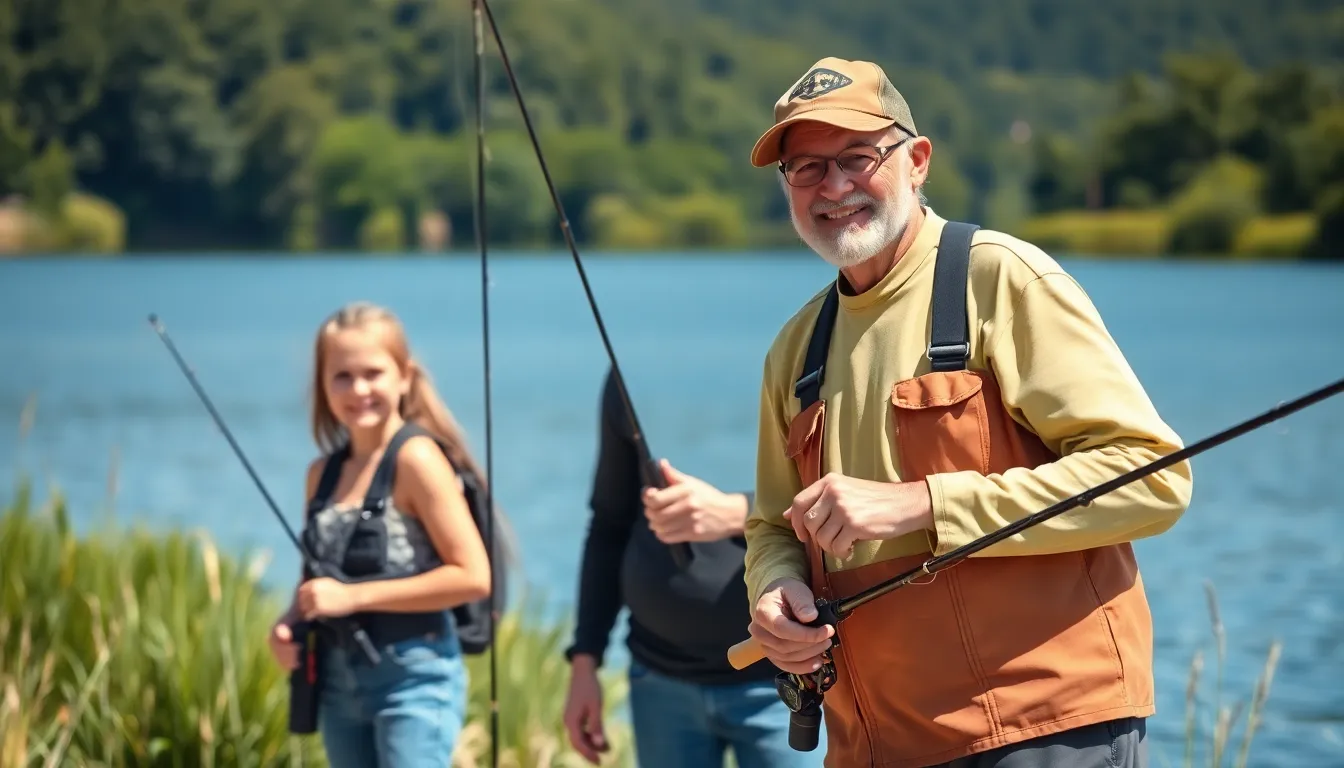Table of Contents
ToggleFishing isn’t just about casting a line and hoping for a bite; it’s a rite of passage for many. But before you reel in that trophy fish, there’s one crucial step: snagging a fishing license. Think of it as your VIP pass to the great outdoors, ensuring you fish legally while avoiding any unwelcome run-ins with the fish police.
Overview of Fishing Licenses
Fishing licenses serve as a formal permission required to fish legally in various waters. Multiple types of licenses exist, including freshwater, saltwater, and combination licenses. Specifics of each license vary by state, so individuals should consult their local wildlife agency for details.
Regulations typically govern fishing methods and species that anglers can catch. Many states allow specific seasons during which fishing is permitted. Moreover, fishing licenses often contribute to conservation efforts and the maintenance of aquatic ecosystems, as funds typically support wildlife programs.
Licenses usually come in various durations: daily, annual, or multi-year options. Different fees apply to residents and non-residents. It’s important to understand that specific age groups may qualify for exemptions or discounts.
Compliance with licensing regulations helps preserve fish populations and habitats. Anglers caught fishing without a license face fines or legal action, underscoring the necessity of obtaining one. In addition, educational resources about fishing laws and best practices often accompany license applications.
Obtaining a fishing license has become more accessible with online application systems in many regions. Anglers can purchase licenses conveniently from home, enhancing participation in fishing activities. Understanding the scope of fishing licenses empowers individuals to engage responsibly in the sport while safeguarding communal resources.
Types of Fishing Licenses

Fishing licenses vary based on the type of water and regulations in each state. Anglers must understand these licenses to fish legally and protect aquatic ecosystems.
Freshwater Fishing Licenses
Freshwater fishing licenses are necessary for fishing in lakes, rivers, and streams. States issue these licenses to promote sustainable fishing practices. Fees for freshwater licenses differ between residents and non-residents. Some states provide options for daily, annual, or multi-year licenses. Certain age groups, like children and seniors, may qualify for discounts or exemptions. Specific regulations may apply regarding the species catch limits and fishing seasons.
Saltwater Fishing Licenses
Saltwater fishing licenses are essential for those fishing in oceans or marine waters. Regulations governing these licenses vary significantly by state. Similar to freshwater licenses, fees depend on residency status and can range from daily to multi-year options. Some states require additional permits for specific species, like sharks or billfish. Certain states also offer discounts for senior anglers or youth fishermen. Understanding these requirements ensures that anglers fish legally while preserving marine habitats.
How to Obtain a Fishing License
Acquiring a fishing license involves a straightforward process that ensures anglers follow local regulations. Familiarity with the specific requirements in one’s state enhances the experience.
Application Process
Anglers can obtain a fishing license through various channels. Online applications provide a convenient option, with many states offering user-friendly websites for this purpose. In-person applications are also available at designated locations such as bait shops or wildlife offices. Depending on the state, individuals may need to complete a short quiz on local regulations. Payment methods typically include credit cards and checks. Each applicant gets immediate confirmation of the license once approved.
Required Documents
Various documents may be necessary when applying for a fishing license. Identification that verifies age and residency is crucial, often requiring a driver’s license or state-issued ID. Some states mandate proof of previous fishing licenses, especially if applying for a discount. If the applicant is a minor, parental consent may be necessary, along with necessary documentation. Anglers should also bring payment information for the associated fees. Ensuring all required documents are ready streamlines the application process and helps avoid delays.
Benefits of Having a Fishing License
Having a fishing license provides legal authorization to fish in designated waters, ensuring compliance with regulations. It fosters conservation efforts through funding wildlife programs and habitat restoration projects. By purchasing a license, anglers contribute to maintaining healthy fish populations and aquatic ecosystems.
Access to various fishing areas becomes possible with the right license type, whether freshwater or saltwater. Specific regulations often apply, such as catch limits and designated seasons, which enhance the fishing experience while preserving resources. Knowledge of these regulations helps anglers make informed decisions and avoid legal consequences.
A fishing license often comes with perks, including discounts on fishing gear or participation in local events. Additional benefits may include eligibility for specialized permits for specific species, allowing anglers to target unique catches. States periodically offer programs to encourage youth participation, boosting engagement in the sport.
Easily accessible, fishing licenses can be applied for online or at local offices. This convenience simplifies the application process, allowing anglers to fish sooner. Some states even facilitate short quizzes, reinforcing compliance with local regulations while ensuring a safer fishing environment.
Overall, the advantages of obtaining a fishing license extend beyond legality. They enrich the angling experience, promote responsible fishing practices, and contribute to sustaining natural resources for future generations.
Common Questions About Fishing Licenses
Understanding fishing licenses begins with knowing their purpose. A fishing license serves as official permission to fish in designated waters, ensuring compliance with local regulations. Many anglers frequently ask about the types of licenses available. There are freshwater, saltwater, and combination licenses, each tailored to specific fishing environments.
Different states impose varying fees for licenses based on residency status. Residents typically enjoy reduced rates compared to non-residents. People often inquire about duration options too. Licenses can be daily, annual, or multi-year, allowing flexibility based on fishing frequency.
Exemptions and discounts may apply to certain age groups. Youth often qualify for lower fees or free licenses in some regions. Regulations and guidelines also pique interest, especially regarding catch limits and fishing seasons. Knowledge of local rules enhances the fishing experience and promotes conservation.
Some anglers wonder about the application process. Obtaining a license is streamlined through online applications, making it more accessible than ever. Essential documents usually include identification proving age and residency, especially for minors who may need parental consent.
Benefits extend beyond legality. A fishing license grants access to various fishing locations and opportunities for exclusive permits targeting specific species. Anglers appreciate perks that often accompany licenses, like discounts on equipment or invitations to local events.
Many states actively support youth engagement initiatives in fishing. These programs encourage younger generations to participate while learning about responsible fishing and conservation efforts. Overall, fishing licenses fundamentally enhance the angling experience while promoting sustainable practices.
Obtaining a fishing license is a vital step for anyone looking to enjoy fishing responsibly. It not only ensures compliance with local regulations but also supports conservation efforts that protect aquatic ecosystems. By investing in a fishing license, anglers contribute to the sustainability of fish populations and habitats while gaining access to a variety of fishing opportunities.
The convenience of online applications makes it easier than ever to secure a license. With various types available and potential discounts for youth and residents, there’s an option for everyone. Embracing the responsibility that comes with a fishing license enriches the overall fishing experience, fostering a culture of respect for nature and future generations.



